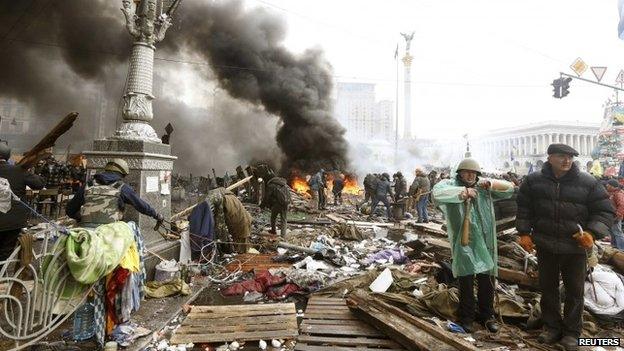Kiev protests: A fight over influence of the West
- Published
- comments

Countries formerly in Russia's sphere of influence will be watching the outcome of the Kiev protests closely
It is little wonder US Secretary of State John Kerry shows "grave concern" over the "unacceptable" violence in Ukraine.
The battle for Ukraine is about the influence and reach of the West in the world.
It is about whether people still look to the US as a leader and as part of the future they want. It is also part of a struggle that is even older than the United States as a country.
One of the most depressing interviews I've heard recently was on the BBC News Channel with the philosopher Alain de Botton, external, who was apparently suggesting our coverage of Ukraine was excessive, based on the attraction of violence and about a far-away country that means little to most people.
He's a pretty smart guy, so it is worrying if he doesn't get what's at stake.
This is far more than a story of nasty men and naughty words.
Since the fall of the Soviet Union, Russia has lost out catastrophically to the West. Rightly or wrongly it sees the EU as a US cat's paw. Not only are former allies like Poland and the Czech Republic key members of the EU, so are parts of the old USSR itself, like Lithuania and Latvia.
Russia's historic ally Serbia (remember World War One, anyone?) has now decided it wants to join too.
The European Union can seem sclerotic, old and underperforming. But it still represents the West, and has an immense lure. Surrounding, less wealthy countries, are drawn to it like iron filings to a magnet.
Death on the streets, riot shields being thumped and Molotov cocktails thrown are the manifestation, but all this started because of the desire of many Ukrainians to join the EU, and Russia's feeling this was where its diminution in power had to stop.
Putin wants a Eurasian Union to counter the EU and has his own inducement in oil and aid, external. Ukraine's strong man has enthusiastically backed that path.
Georgia and others in the region, inclined to side with the West, will be watching closely.
The 18th Century philosopher Gottfried Wilhelm Leibniz warned Russia had become "the Turks of the North" - in other words, Europe's old challenge was the Ottoman Empire and that Russia had become a similar territorial and ideological threat.
The 20th Century proved him right in spades. History is not over. I am pretty sure that we are in a sufficiently grown-up world that this is not going to spark armed conflict between our version of the Great Powers.
But with Europe seen as weak and Barack Obama perceived as disengaged from abroad, what happens next is vitally important.